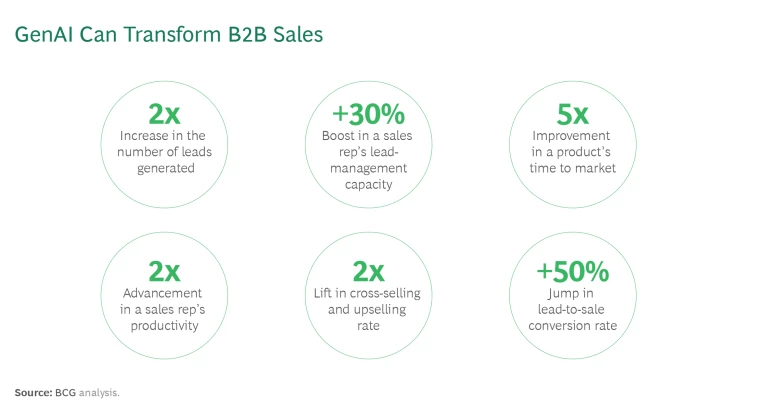As generative AI fever sweeps across industry, it can be difficult to separate its legitimate promise for B2B sales from all the noise. But here is a leading indicator: high-performing sales organizations are 1.9 times more likely to be using AI already than underperformers, according to Salesforce’s 2022 State of Sales report.
We believe that much of the excitement about how GenAI can transform the B2B sales process is warranted. We estimate that it could double a sales rep’s productivity and offer a similar improvement in cross-selling and upselling rates. (See the exhibit.) It is a powerful technology that can offer tangible value to sales teams.

So how should sales leaders think about GenAI to deliver the benefits at speed and scale?
- Focus on effectiveness, not just efficiency. Sales reps are generally doubtful that AI can perform even small parts of their job. However, GenAI offers leaders a different approach. Rather than using AI in place of sales reps, leaders can use GenAI to assist them by providing a digital support team—specifically, four sales personas: a talented sales assistant that can brief reps before every call, a data scientist that can help reps find new prospects, a personal marketer that can polish and personalize emails, and a wise sales coach that can help reps become top performers. This support will improve efficiency. But the real prize is boosting effectiveness—helping sales reps build a more robust pipeline and close more deals to boost revenue growth.
- Shift from a task approach to a big-picture mindset. Think of each GenAI persona as a new team member in that it needs to be trained. To get the maximum benefit from this new addition, provide the persona with instructions that will impact the big picture for the sales organ-ization, rather than teaching it specific, discrete tasks. For instance, teach the GenAI sales coach to guide sales reps to grow a qualified pipeline, rather than to increase their conversion rate.
- Start building trust, acknowledging that it will take time to develop. For a sales organization to reap the benefits of GenAI, the sales reps must trust the technology and how it is implemented. Create an environment where the capabilities and contributions of the GenAI personas increase over time. A keen understanding of the sales reps’ needs and the selling process is required to tune the technology.
Meet the New Digital Team
B2B sales leaders should think about the deployment of each GenAI application as if they were hiring an additional team member, instead of rolling out a technology solution. A new hire needs time to learn the ropes and get up to speed, and so does a GenAI persona. Sometimes a new team member has a rocky start before excelling, and likewise, so can a GenAI persona. Adopting this mindset will help sales reps think about GenAI differently than they do about AI. Sales organizations should “hire” four GenAI personas to boost the performance of the sales team.
The Ultimate Sales Assistant. A GenAI sales assistant can improve the effectiveness of sales reps by helping them spend more time doing what they were hired for—selling. Just 32% of the average salesperson’s workweek is spent selling, according to a 2022 report by Sales Mastery.
A powerful task for the GenAI sales assistant is to brief reps before any call, pulling together key data from across the customer relationship management (CRM) database (and others) in an actionable, succinct format. But updating the CRM system is vital too. Poor-quality customer CRM data is a key reason why some companies fail to realize the value of their CRM system. Research from Sales Mastery shows that 40% of sales managers use their CRM solution only for data storage, and 14% are not actively using their CRM system at all.
Updating data in the CRM system after customer meetings to maintain data hygiene is something that many reps do not do, which increases the amount of rogue data and hinders the quality of insights. Other reps pass off this task to an inside sales rep, wasting time and resources. A GenAI assistant, however, can scan through emails, conversations, and other client interactions and either make the update or ready it for approval by the rep.
A GenAI sales assistant can also provide a positive feedback loop for itself: the assistant improves the CRM system’s data quality, which, in turn, makes the assistant’s contributions more impactful.
An Exclusive Data Scientist. A GenAI data scientist can enhance the performance of sales reps by providing
data-driven insights. For example, it can alert reps to the following:
- High-priority prospects and the right time to engage with them
- Cross-selling opportunities to pursue and the types of tactics that have proved most effective with similar prospects
- Sales collateral that is the most effective based on the solution or competitive positioning
- Discounts that should be offered on the basis of customers’ past behavior as well as industry or regional trends; using data, the GenAI data scientist can advise on how to tune the incentives to maximize conversion but minimize excessive discounting
Current analytics and AI capabilities often provide sales reps with too much data (requiring them to act as data analysts to interpret it) or too little (in which case they are unlikely to use or trust the data). The GenAI data scientist can help cut through the noise and provide specific use case guidance with enough detail to empower the reps to take action.
A Personal Marketer. Marketing materials that are crafted and personalized to each customer can enhance the top-of-funnel success rate, and a GenAI marketer can deliver this at scale. Personalized emails, proposals, and other marketing materials feel more relevant to prospects and customers, boosting conversion rates. The GenAI marketer is a proven use case; marketing teams are among those that are quick to deploy GenAI. An April 2023 BCG survey shows that 91% of the chief marketing officers who are using GenAI reported a positive impact on efficiency . The most common task that is given to GenAI is the creation of hyperpersonalized marketing materials.
Currently, many sales teams use automated templates, and sales reps usually have to customize these further. A GenAI-powered marketing persona could go far beyond this, keeping a consistent correspondence style while suggesting to a sales rep what is working for others on the team. A GenAI solution can also edit emails and other materials.
The Best Sales Coach. The most powerful way to improve a salesperson’s performance is coaching—but delivering it in person is a serious drain on the organization’s resources. A GenAI coach persona could be a solution.
The value of coaching is shown in Salesforce’s 2022 report, State of Sales, which found that 81% of sales reps agree or strongly agree that the coaching from their manager is valuable.
GenAI coaching can be data-driven and personalized, informing sales reps about their individual performance and how it diverges from their best-in-class colleagues and offering guidance on how to improve. But GenAI coaching can be particularly potent for sales organizations that implement BCG’s SuccessDNA methodology, which aims to establish the dominant behavioral traits and skills that drive performance in a company by conducting behavioral testing. Sales managers then use the results to help reps who are underperforming.
A GenAI coach can turbocharge this method by gathering in-depth activity data from chatbot-based simulations to determine a salesperson’s strengths and weaknesses. For example, a chatbot could ask a sales rep a series of questions, such as, “What would you do if you received this email from a prospect who you hope is about to sign a contract?” The coach could also glean data from a rep’s activity in the CRM system and then run simulations to hone the rep’s skills, or the coach could help in real time as the rep plans meetings and writes emails. We have seen SuccessDNA increase the proportion of sales reps beating quota by 30%, but this could be substantially raised with help from a GenAI sales coach.
Three Important Risks
Acknowledging the inherent risks is vital to getting ahead of them. There are three significant ones:
- Being left behind by not implementing GenAI, by giving up when the first GenAI application doesn’t deliver as expected, or by implementing GenAI for only one use case and tapping only 10% of its potential.
- Missing the value, overspending, and increasing technical complexity by not optimizing the process by which GenAI is brought into the organization. Before deciding whether to build or buy GenAI solutions, sales leaders need to understand their most impactful use cases and clarify where their CRM provider is investing and the future capabilities that it will provide. Then a company can create a roadmap for implementing GenAI. Performing this exercise is critical to avoid unneeded technical debt, reduce the overall implementation cost, and determine the off-platform tools and data sets in which the company should invest.
- Losing sales reps’ trust by asking a GenAI application to conduct activities that are beyond its current capabilities. This is important because losing trust will slow the adoption by sales reps who are already skeptical of the value that AI provides.
Onboarding GenAI
The easiest way to onboard the first set of GenAI team members is by activating the CRM provider’s built-in offerings. It’s generally easy to identify a handful of sales reps who are willing to test the CRM system’s new GenAI capabilities and who can adopt the right mindset. The reps should use accounts with good quality data to validate the capabilities and size the improvement potential so the company can track the impact.
Typically, the first capabilities to evaluate are those that are built to handle relatively easy administrative tasks, such as updating and linking CRM records or drafting email templates—tasks that are often assigned to an intern, rather than to a sales assistant. Taking this step allows the sales organization to start creating a process for adding GenAI personas to the team, closing the feedback loop, and building trust with the team that will be working with more powerful capabilities in the future.
However, even low-level GenAI deployments should be run through the company’s process for testing new go-to-market approaches. If such a validation process does not exist, then it’s urgent to create one ahead of more fundamental changes that subsequent GenAI deployments may trigger.
In addition to looking for quick wins, it is vital that sales leaders identify more-advanced needs that GenAI applications can address in the long term. Leaders should look at four areas.
Potential. A GenAI persona will require some adjustment after the first deployment, but improvement should be rapid. Oversight can then be progressively reduced, and the GenAI team member can take an increasingly important role. A GenAI assistant, for example, can start in an administrative role and then graduate to inside sales. One multinational company is already deploying GenAI to help with strategic accounts.
If a GenAI persona doesn’t learn rapidly, assess the prompts—the questions used to trigger GenAI output—and the data. Poorly written prompts and poor-quality data can affect the outcomes.
People. The sales team needs to be at the center of the process. Successful sales leaders are careful not to upset the team’s chemistry—with a human or digital addition. It’s essential to assess the end-to-end impact on the team, empower leaders, and create a positive narrative about GenAI deployment.
Some sales reps may initially resist some of this assistance, especially the sales coaching outlined earlier. BCG research shows that regular users of GenAI are more optimistic about the technology than nonusers (62% versus 36%). This clarifies the importance of working with sales reps to overcome any misgivings or concerns.
Policies. Most large companies are assessing their policies to address complications in the business and regulatory environments prompted by the advent of GenAI technology. They need to think about the following:
- The handling of personal data, particularly if they are covered by Europe’s General Data Protection Regulation. If a company is operating within this legal framework, it needs to be careful, expecially when building profiles from multiple data sources.
- New GenAI-specific risks, such as confidential data being used to train another organization’s GenAI model.
- Possible AI regulation, which is being considered in many jurisdictions.
Such efforts are critical to getting the B2B sales team to accept the new digital team. BCG research shows that employees will accept AI technology in the workplace but only if they think their employer is committed to doing the right thing—and if they have confidence that AI won’t make their job disappear.
Platforms. When considering GenAI platforms, sales leaders should assess building versus buying, flexibility, and speed to value. Leaders should evaluate where they can leverage platform innovations, such as Salesforce’s GenAI capabilities, to accelerate the delivery of function-specific use cases. When determining which vendors or platform solutions to use, leaders should consider if they can be implemented across the organization to prevent siloed solutions or a proliferation of disconnected GenAI solutions.
The GenAI Journey
GenAI is the right technology at the right time. The digitization of the sales process that was accelerated during the pandemic now means that there is a much richer data pool to use to train GenAI personas. A GenAI persona can’t extract information from face-to-face meetings, but it can access online communications, including online conference calls and meetings.
The technology is developing fast. Even if you do not see a killer app for your B2B sales team today, one may be up and running at a competitor in a few months’ time. As such, digital teams will soon become as integrated and commonplace as human ones. Anyone running a B2B sales organization needs to start preparing now.













